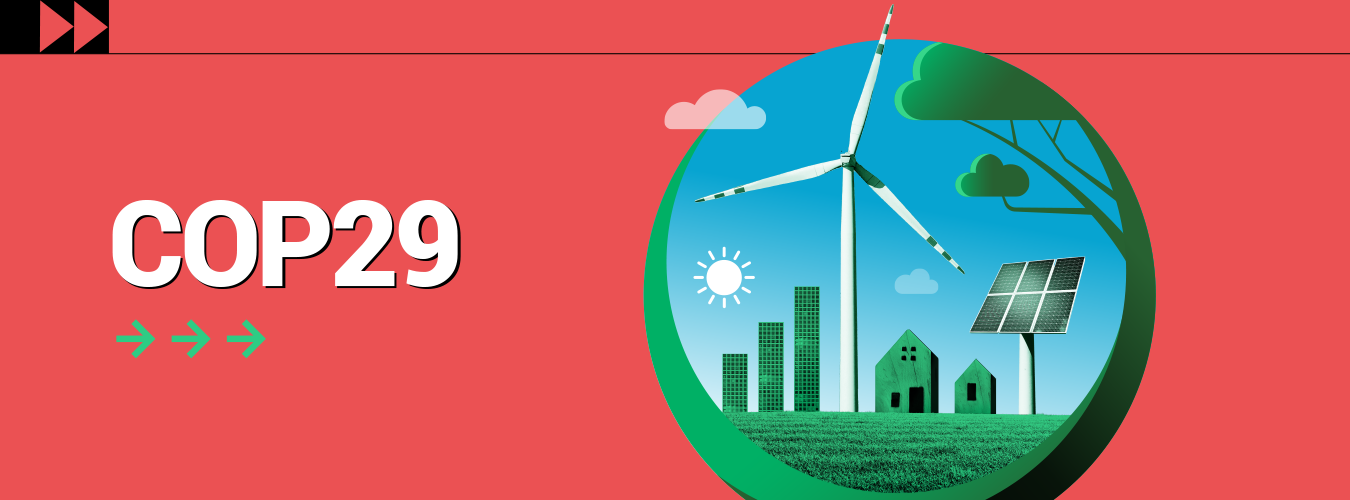
With the sudden proliferation of early decorations, you may think we have entered the season of Christmas festivities however we are firmly in the season of COPs. The Biodiversity conference, COP16, took place from 14th October to 2nd November in Cali, Colombia while its better known cousin the Climate conference, COP29, will take place in Baku, Azerbaijan, from 11 to 22 November 2024. These two conferences are the core mechanisms we have to deal with the dual climate and biodiversity crises which we are currently experiencing.
It is no longer possible to escape the impacts of these crisis or console ourselves with hopes that the consequence hit in other places at different times. The devastating and deadly floods in Valentia, Spain last week will ensure that we are painfully aware that the impacts of climate change can hit where we least expect them and it can rip communities, families and lives apart with its strength. While the biodiversity crisis can seem less dramatic, the almost complete absence and collapse of numbers and abundances of species compared to historic abundances can leave little doubt that we are living in an extinction event of our own making. Our reliance on these systems – a stable climate, healthy biodiversity and functioning ecosystems – is absolute. Without them we are lost.
Are these our best efforts?
Despite all this, as an international community we seem to be deeply unserious about the climate and biodiversity crisis. Cop16 on biodiversity finished in disarray last Saturday with the vitally important issue of how to fund biodiversity protection left unresolved. The reason that the talks had to finish abruptly? Less developed nations could not afford to change their flights. Continuing discussions with less than half the countries remaining was impossible. This exemplifies Pope Francis assertion in Laudato Si, published just before the COP negotiations in Paris nine years ago, that “we have to realize that a true ecological approach always becomes a social approach; it must integrate questions of justice in debates on the environment, so as to hear both the cry of the earth and the cry of the poor.” (LS46) The inequality that exists, not only permeates into these talks and reduces poorer countries ability to participate to the same extent as richer counties but it also exposes them, and makes them more vulnerable, to extreme climate impacts including drought, heatwaves, flooding, sea inundation and food insecurity. Without the security and buffer of vast amounts of wealth the chaos which is unleashed amplifies existing inequalities and injustices including poverty, food insecurity and infrastructure vulnerability.
This injustice will be mirrored in some ways in COP29 taking place next week. The question of money is never far away with richer countries consistently having more resources to negotiate a deal with suits them best while failing spectacularly to fund, or facilitate the funding through different types of finance, the transition away from carbon intensive economies.
The Finance COP
Following the successful launch of the Loss and Damage Fund at COP28, some dubbed this year’s conference in Baku as the “Finance COP.” The conference will focus on operationalising the fund and ensuring its function is fit for purpose.
For developing countries finance for Loss and Damage and Adaption is key as well as access to technology and investment in renewable energy to allow for clean, decarbonised development.
At JCFJ we are working with the Jesuit European Social Centre (EU), Jesuit Missions UK, the Arrupe Centre (Madagascar) and the Jesuit Centre for Ecology and Development (Malawi), on the Jesuits for Climate Justice – COP29 Campaign.
Jesuits for Climate Justice is urging delegates to prioritise three key areas: the effectiveness of the Loss and Damage Fund, climate debt cancellation, and acceleration of a just energy transition.
Loss and Damage
A central debate surrounds the new global climate finance goal (NCQG) and whether it will include specific targets for loss and damage funding. While uncertainty persists, there’s strong momentum for increased adaptation funding, with a proposed target of 50% of climate finance allocated to this area.
As of September 2024, $702 million has been allocated to the Loss and Damage Fund, while it is very questionable whether this is sufficient there is the opportunity in COP29 to boost this fund.
Cancelling climate debt
Many countries at the forefront of climate change which struggle to finance adaptation are facing substantial debt burdens.
Amnesty International reports that Ethiopia currently allocates three times more funds to debt repayment than climate adaptation efforts. Similarly, nations like Congo and Mozambique consistently prioritise debt servicing over climate action. Lower-income countries are spending over 12 times more on debt payments than on climate adaptation.
This financial strain creates a vicious cycle: countries incur more debt to manage climate impacts, which further impedes their ability to invest in durable solutions. With current climate finance mechanisms proving inadequate, COP29 has an opportunity to advance debt cancellation measures that could protect millions from escalating climate change effects.
Ensuring a just transition
COP29 has positioned just transition as a priority, emphasising deep emissions cuts while ensuring no one is left behind. Moving away from fossil fuel development into cleaner, decarbonised economies needs to happen in a way which ensures the developing chains of supply benefit developing countries as well as those in the developed, richer countries as well as ensuring sustainable development in the global south.
Jesuits for Climate Justice – how you can get involved
The COP process can seem like a distant event which we can exert no control over. However, as a general election looms in Ireland we all can recognise that we can use our voices for the common good. Contacting TDs during this busy campaigning time and demanding action on climate justice – both here and abroad is an incredibly powerful way to use our voices to stand for those who have, and certainly will be impacted.

